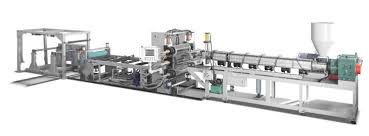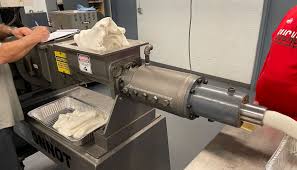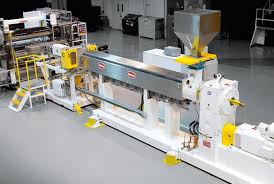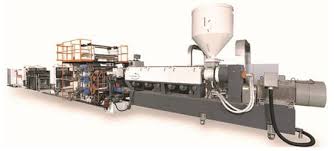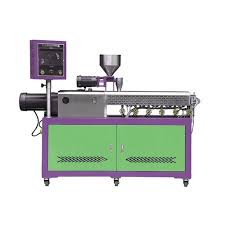In the fields of plastics, pharmaceuticals, and food science, product development and material testing demand precise and small-scale equipment. A mini lab extruder machine offers a compact, efficient solution for research laboratories, universities, and pilot plants looking to test formulas or simulate production processes without the cost and complexity of full-sized industrial extruders.
What Is a Mini Lab Extruder Machine?
A mini lab extruder machine is a scaled-down version of a traditional extruder, typically designed for laboratory use. It performs the same core function—melting, mixing, and shaping materials through a die—but with smaller batch sizes, easier handling, and tighter process control.
These machines are often used in:
Polymer formulation testing
Masterbatch and additive development
Food extrusion experiments
Pharmaceutical hot melt extrusion (HME)
Biopolymer and biodegradable material R&D
Key Features of Mini Lab Extruders
Compact Footprint
Designed to fit on benchtops or in small labs, mini extruders save space while delivering reliable performance.Low Material Requirement
Can operate with as little as 50g–200g of material—ideal for costly or limited raw ingredients.Precise Temperature and Pressure Control
Zone-based heating and built-in sensors offer accurate, repeatable results across experiments.Interchangeable Screw Designs
Many lab extruders allow for custom screw configurations (co-rotating, counter-rotating, single or twin-screw) for different mixing profiles.Easy Cleaning and Maintenance
Quick disassembly and small components make changeovers between materials fast and hygienic—especially useful in pharma and food testing.Data Logging & Control Software
Integrated PLCs or touchscreen interfaces allow real-time monitoring of torque, speed, temperature, and pressure, with exportable data for R&D documentation.
Applications of Mini Lab Extruder Machines
Plastic & Polymer Development: Test new resin blends, fillers, or colorants.
Food Science: Develop prototypes for pasta, cereals, protein snacks, or pet food.
Pharmaceutical Research: Process drug compounds into extrudates or pellets for solubility studies and controlled release.
Material Innovation: Test bio-based or recycled materials before scaling up to production.
Benefits of Using a Mini Lab Extruder
Cost-Efficient R&D: Avoids wasting large amounts of expensive materials.
Faster Product Development: Speeds up prototyping and formulation trials.
Predictive Scaling: Simulates production processes accurately for easier transition to full-scale manufacturing.
Versatile Testing: One machine can support multiple industries and material types with minor adjustments.
What to Look for When Buying
When selecting a mini lab extruder machine, consider:
Screw type and L/D ratio (length-to-diameter)
Heating and cooling system precision
Output capacity (typically 0.1–5 kg/hour)
Die head and feeder customization options
Material compatibility (polymer, food-grade, or pharma-grade)
Manufacturer support, especially for calibration and training
Final Thoughts
A mini lab extruder machine is a powerful tool for innovation, allowing researchers and product developers to test new ideas efficiently and at low cost. Whether you’re developing new polymers, experimenting with food textures, or conducting pharmaceutical trials, a lab-scale extruder offers the flexibility and control you need to succeed.


